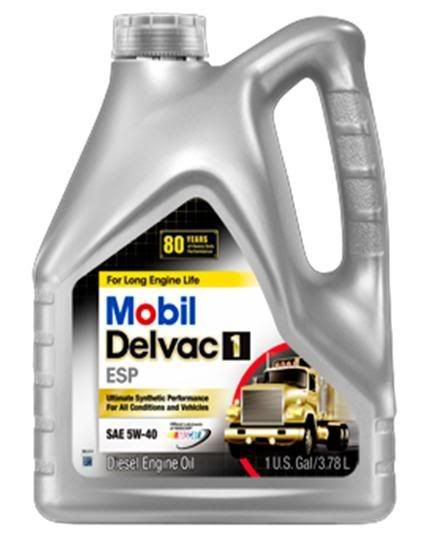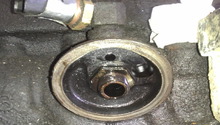Jeep Cherokee 1984-2001: Everything You Need to Know About Engine Oil
There is a vast selection of engine oils on the market that can make choosing the right oil for your car a difficult proposition. With modern chemical engineering, there is literally an oil available for every application.
This article applies to the XJ Jeep Cherokee (1984-2001).
Have you ever taken a trip down the oil aisle at the local auto parts store only to be confronted with a seemingly endless selection of motor oils? With such a wide variety of engine oils on the market, choosing the right oil that provides adequate engine protection, while maximizing fuel efficiency, can be overwhelming. Multi-viscosity, blended, synthetic, detergents, and additives are all terms that are freely thrown around when the salesman tries to pitch you five quarts of the "daily special" oil that is on sale, but what do those terms really mean and how do they affect your engine? This article will give a basic overview of engine oils and answer a few frequently asked questions that consumers normally have when choosing an oil for their vehicle. Hopefully, this article will provide you adequate information to make future oil selections easy as pie.
Oil Breakdown
Base Stock
Ninety-nine percent of all motor oils begin life as crude oil. The crude oil is extracted from the ground and processed to the point where engineers have a paraffinic or napthinic oil that varies in weight and chemical characteristics. The base stock oils are then classified with a "Group Rating," ranging from level 1 to level 5 depending on their level of refinement. In general, Group 1 oils undergo the simplest and cheapest refining process, thus they are the most inexpensive. Most oils sold in the U.S. range between Group 2 and Group 4. Group 4 oils are typically fully synthetic; however, many Group 3 oils are now carrying the "synthetic" badge despite being hydrocracked (refined with extreme pressure and heat) versus undergoing a synthesizing process of a full synthetic oil.

Synthetic vs Conventional
Prior to the 1990's, conventional oil dominated the motor oil market. Although synthetics have been around for the better part of a century, consumer product lines really took off in the 90's as well as early 2000's and are the standard oils used in many of today's modern engines. Generally speaking, a synthetic motor oil is much less susceptible to break down and loss of its lubricating abilities under extreme heat and extended mileage compared to a conventional oil. Synthetic oils offer the highest level of performance and protection for your engine, as well as extended drain intervals, but this comes at a premium because most synthetics typically cost 50% more than a conventional oil. In addition to synthetic and conventional oils, many manufacturers offer a synthetic blend that provides many of the benefits of a synthetic, but at a reduce price.

Viscosity
Viscosity is the term used to establish the rate of flow and shear resistance of an oil. The higher the viscosity number, the thicker the engine oil. The correct oil viscosity is very important to the operation of the engine, as the oil must properly lubricate and support internal engine parts while minimizing power loss and fuel consumption. Multi-grade oils, such as a 5W-30 oil, are popular because they are thinner when cold and allow better lubrication during start-up and cold weather, but thicken to provide the viscosity of a heavier oil at operating temperature. As engine oil ages, the molecular makeup is affected and the oil viscosity often thins outs; hence, one of the many reasons for oil change intervals.

Additives
The additive package is often where the more expensive oils separate themselves from the lesser oils. Additives include friction modifiers, rust and corrosion inhibitors, detergents, oxidation inhibitors, as well as dispersants. Friction modifiers or anti-wear additives have an affinity for metal engine components and provide a film to supplement oil lubricating qualities. Perhaps the most talked about oil friction modifier is ZDDP (Zinc dialkyldithiophosphates) and its ability to combat engine wear. While different engine oils use varying amounts of ZDDP, many manufacturers are limiting ZDDP because it is said to diminish the life of catalytic converters. Corrosion inhibitors work to prevent acidic buildup in the used oil and combat any particles or compounds that may enter the engine. Detergents and dispersants are added to fight the buildup of sludge by trapping deposits in the oil and neutralizing impurities. Similar to viscosity, additives break down over time and cannot provide adequate protection to the engine, thus regular oil change intervals are needed, especially in extreme environments.

Scheduled Maintenance Interval
The factory recommended oil maintenance interval for XJ Cherokee models is up to 7,500 for light duty use, and 3,500 miles for severe duty. If your vehicle is driven short distances, typically five miles or less at a time, the oil will not reach operating temperature and allows for condensation, fuel, and combustion by-products to gather in the oil, thus needing more frequent oil changes. Additionally, vehicles driven in harsh environments will require shorter service intervals compared to a car that sees regular highway commutes. Most individuals opt to change their oil between the 4-5k mile mark regardless of vehicle usage and oil type. There are companies, such a Blackstone Labs, who specialize in used engine oil analysis and can determine how much life your engine oil has left in it by sending them a small oil sample to evaluate the remaining TBN (total base number) of the oil. An oil analysis can also give a general report on the condition of your engine by evaluating the various metals suspended in the oil that are associated with engine wear.
Common Questions
Should I use a synthetic or conventional oil?
In years passed, many experts would say to avoid using a synthetic oil in an older engine as it will eat up the oil seals and cause oil leaks. With advancements in chemical engineering, modern synthetics are perfectly compatible with an older engine and are generally preferred for their better wear characteristics and longer service life. That being said, it is perfectly fine to use a conventional motor oil as long as you stick to the manufacturer's maintenance schedule. Synthetic blends can also be considered for the additional engine protection they provide with only a moderate price increase over conventional oils. If opting for a synthetic oil, be sure your engine is free of oil leaks as a synthetic oil has the potential to make its way passed leaky areas easier than a conventional oil.
What oil viscosity should I use?
Choosing the correct oil viscosity is largely related to the type of driving you will do and the environment in which the car is operated. A car that is operated in a cooler environment and is used as a daily driver will be perfectly fine with a lighter weight oil. In contrast, a car that sees extreme heat, regularly goes off-road, or is used to tow or haul heavy loads and sees higher engine temperatures will benefit from a heavier oil that is less likely to shear (lose viscosity). The vehicle owner's manual typically has a guide for choosing the correct oil based on the ambient temperature.

Do I need a high mileage oil?
Vehicles with 75,000 miles or more are generally good candidates for a high mileage engine oil. A high mileage oil is typically formulated with additional additives to help condition oils seals, prevent the formation of sludge, and limit engine oil consumption. Most high mileage oils utilize a higher base oil viscosity to cope with internal engine wear and provide better engine protection in high temperatures.

Can I use a diesel engine oil in my gas engine?
A popular choice for many individuals is to run an engine oil formulated for a diesel engine in their car. Oils such as Shell's Rotella or Chevron's Delo are among the many oils that have higher levels of ZDDP wear additive than that of a standard passenger car oil. These diesel oils often have additional detergents to cope with exhaust gas recirculation systems fitted on modern heavy duty commercial trucks. If you're subjecting your engine to grueling load, or frequent abuse, the higher ZDDP content may prevent excessive engine wear.

Related Discussions
- Best Oil For High Mileage Jeep? - CherokeeForum.com
- Best Engine Oil? - CherokeeForum.com
- What Oil Weight? - CherokeeForum.com






